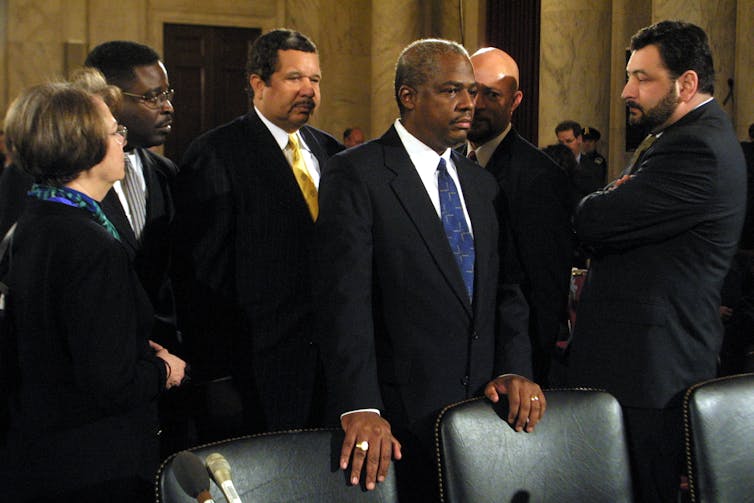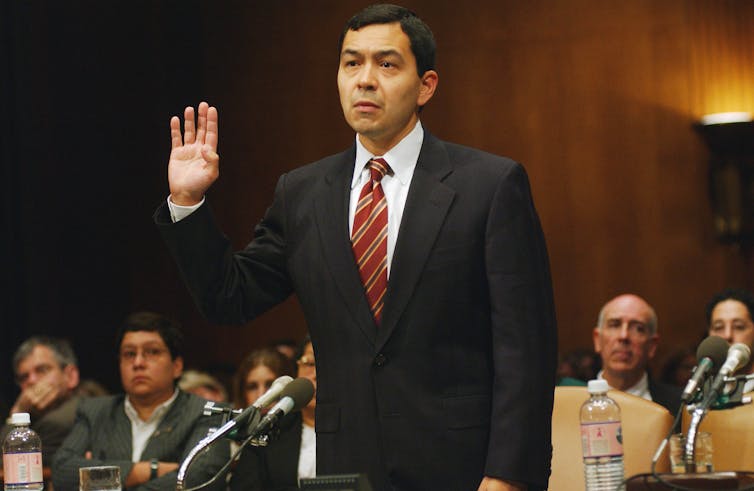President Donald Trump’s nomination of his former felony protection legal professional, Emil Bove, to be a choose on the US Courtroom of Appeals for the third Circuit, was mired in controversy.
On June 24, 2025, Erez Reuveni, a former Division of Justice legal professional who labored with Bove, launched an intensive, 27-page whistleblower report. Reuveni claimed that Bove, because the Trump administration’s performing deputy legal professional common, stated “that it might become necessary to tell a court ‘fuck you’” and ignore court docket orders associated to the administration’s immigration insurance policies. Bove’s performing function ended on March 6 when he resumed his present place of principal affiliate deputy legal professional common.
When requested about this assertion at his June 25 Senate affirmation listening to, Bove stated, “I don’t recall.”
And on July 15, 80 former federal and state judges signed a letter opposing Bove’s nomination. The letter argued that “Mr. Bove’s egregious record of mistreating law enforcement officers, abusing power, and disregarding the law itself disqualifies him for this position.”
A day later, greater than 900 former Division of Justice attorneys submitted their very own letter opposing Bove’s affirmation. The attorneys argued that “Few actions could undermine the rule of law more than a senior executive branch official flouting another branch’s authority. But that is exactly what Mr. Bove allegedly did through his involvement in DOJ’s defiance of court orders.”
On July 17, Democrats walked out of the Senate Judiciary Committee vote, in protest of the refusal by Chairman Chuck Grassley, a Republican from Iowa, to permit additional investigation and debate on the nomination. Republicans on the committee then unanimously voted to maneuver the nomination ahead for a full Senate vote.
Late within the night of July 29, and after two extra whistleblower complaints about Bove’s conduct had emerged, the U.S. Senate confirmed Bove’s nomination in a 50-49 vote.
As a scholar of the courts, I do know that almost all federal court docket appointments will not be as controversial as Bove’s nomination. However extremely contentious nominations do come up every now and then.
Right here’s how three controversial nominations turned out – and the way Bove’s nomination was completely different in a vital method.
Robert Bork testifies earlier than the Senate Judiciary Committee for his affirmation as affiliate justice of the Supreme Courtroom in September 1987.
Mark Reinstein/Corbis through Getty Photos
Robert Bork
Bork is the one federal court docket nominee whose identify turned a verb.
“Borking” is “to attack or defeat (a nominee or candidate for public office) unfairly through an organized campaign of harsh public criticism or vilification,” in line with Merriam-Webster.
This refers to Republican President Ronald Reagan’s 1987 appointment of Bork to the Supreme Courtroom.
Reagan known as Bork “one of the finest judges in America’s history.” Democrats seen Bork, a federal appeals court docket choose, as an ideologically excessive conservative, with their opposition primarily based largely on his in depth scholarly work and opinions on the U.S. Courtroom of Appeals for the District of Columbia Circuit.
In opposing the Bork nomination, Sen. Ted Kennedy of Massachusetts took the Senate flooring and gave a fiery speech: “Robert Bork’s America is a land in which women would be forced into back-alley abortions, blacks would sit at segregated lunch counters, rogue police could break down citizens’ doors in midnight raids, schoolchildren could not be taught about evolution, writers and artists could be censored at the whim of government, and the doors of the federal courts would be shut on the fingers of millions of citizens for whom the judiciary is often the only protector of the individual rights that are the heart of our democracy.”
Finally, Bork’s nomination failed by a 58-42 vote within the Senate, with 52 Democrats and 6 Republicans rejecting the nomination.
Ronnie White
In 1997, Democratic President Invoice Clinton nominated White to the US District Courtroom for the Japanese District of Missouri. White was the primary Black choose on the Missouri Supreme Courtroom.
Republican Sen. John Ashcroft, from White’s dwelling state of Missouri, led the struggle in opposition to the nomination. Ashcroft alleged that White’s affirmation would “push the law in a pro-criminal direction.” Ashcroft primarily based this declare on White’s comparatively liberal report in loss of life penalty circumstances as a choose on the Missouri Supreme Courtroom.
Nonetheless, there was restricted proof to assist this assertion. This led some to consider that Ashcroft’s assault on the nomination was motivated by stereotypes that African People, like White, are mushy on crime.
Even Clinton implied that race could also be an element within the assaults on White: “By voting down the first African-American judge to serve on the Missouri Supreme Court, the Republicans have deprived both the judiciary and the people of Missouri of an excellent, fair, and impartial Federal judge.”
White’s nomination was defeated within the Senate by a 54-45 party-line vote. In 2014, White was renominated to the identical judgeship by President Barack Obama and confirmed by largely party-line 53-44 vote, garnering the assist of a single Republican, Susan Collins of Maine.

Ronnie White, a former justice for the Missouri Supreme Courtroom, testifies throughout an legal professional common affirmation listening to in Washington in January 2001.
Alex Wong/Newsmakers
Miguel Estrada
Republican President George W. Bush nominated Estrada to the Courtroom of Appeals for the District of Columbia Circuit in 2001.
Estrada, who had earned a unanimous “well-qualified” score from the American Bar Affiliation, confronted deep opposition from Senate Democrats, who believed he was a conservative ideologue. In addition they frightened that, if confirmed, he would later be appointed to the Supreme Courtroom.

Miguel Estrada, President George Bush’s nominee to the U.S. Courtroom of Appeals for the District of Columbia, is sworn in throughout his listening to earlier than Senate Judiciary on Sept. 26, 2002.
Scott J. Ferrell/Congressional Quarterly/Getty Photos
Nonetheless, in contrast to Bork – who had an intensive paper path as a tutorial and choose – Estrada’s written report was very skinny.
Democrats sought to make use of his affirmation listening to to probe his beliefs. However they didn’t get very far, as Estrada dodged lots of the senators’ questions, together with ones about Supreme Courtroom circumstances he disagreed with and judges he admired.
Democrats have been significantly troubled by allegations that Estrada, when he was screening candidates for Justice Anthony Kennedy, disqualified candidates for Supreme Courtroom clerkships primarily based on their ideology.
In accordance with one legal professional: “Miguel told me his job was to prevent liberal clerks from being hired. He told me he was screening out liberals because a liberal clerk had influenced Justice Kennedy to side with the majority and write a pro-gay-rights decision in a case known as Romer v. Evans, which struck down a Colorado statute that discriminated against gays and lesbians.”
When requested about this at his affirmation listening to, Estrada initially denied it however later backpedaled. Estrada stated, “There is a set of circumstances in which I would consider ideology if I think that the person has some extreme view that he would not be willing to set aside in service to Justice Kennedy.”
Not like the Bork nomination, Democrats didn’t have the numbers to vote Estrada’s nomination down. As an alternative, they efficiently filibustered the nomination, figuring out that Republicans couldn’t muster the required 60 votes to finish the filibuster. This marked the primary time in Senate historical past {that a} court docket of appeals nomination was filibustered. Estrada would by no means function a choose.
Bove stands out
Because the examples of Bork, Estrada and White clarify, contentious nominations to the federal courts typically contain ideological issues.
That is additionally true for Bove, who was opposed partially due to the notion that he’s a conservative ideologue.
However the principle issues about Bove have been associated to a perception that he’s a Trump loyalist who reveals little respect for the rule of regulation or the judicial department.
This makes Bove stand out amongst contentious federal court docket nominations.
This story, initially printed on July 21, 2025, has been up to date to mirror the Senate’s affirmation of Bove.



